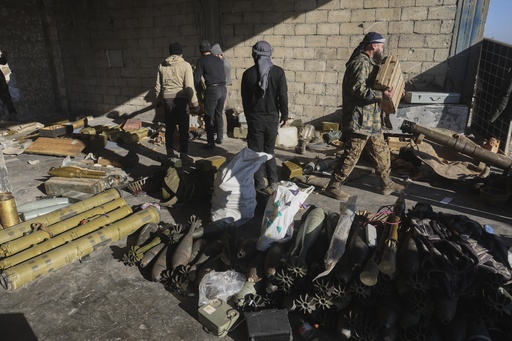
BEIRUT — In recent years, Abu Mohammed al-Golani, the leader of a prominent Syrian militant group, has undertaken a significant transformation in both his public persona and the organization he leads. Having distanced himself from previously established ties to al-Qaida, al-Golani is now seeking to capitalize on a pivotal moment by spearheading a vigorous military campaign that has allowed his forces to gain control over Syria’s largest city. This resurgence is not only reinvigorating the ongoing civil war but also raises crucial questions regarding President Bashar Assad’s authority in the region.
Al-Golani’s trajectory reflects a remarkable shift in power dynamics. His recent military successes stem from years spent navigating among various extremist factions while systematically sidelining rivals and former allies. Throughout this period, he has aimed to shed the infamous reputation linked to al-Qaida, subsequently enhancing his group’s self-proclaimed “salvation government.” This strategy appears designed to attract the attention of international stakeholders as well as the diverse religious and ethnic communities within Syria.
Positioning himself as an advocate of pluralism and tolerance, al-Golani’s efforts aim to increase the legitimacy and public support for his group. However, it has been a considerable time since Syria’s opposition made significant military advancements against Assad’s regime. The Syrian government, aided by support from Iran and Russia, has retained control of roughly 70 percent of the country, creating a deadlock that previously relegated al-Golani and his militant group, Hayat Tahrir al-Sham (HTS), to the periphery.
Recently, the advance of opposition forces into Aleppo and surrounding areas, allied with other Turkish-backed groups known as the Syrian National Army, has disrupted the fragile equilibrium in Syria. This upheaval has incited concerns among neighboring countries such as Jordan, Iraq, and Lebanon, which fear that this intensifying conflict may overflow into their territories.
Al-Golani’s early involvement with extremist factions originated in Iraq back in 2003, during his participation in battles against U.S. forces. Despite facing multiple detentions by the U.S. military, he continued to operate in Iraq, riding the waves of various militant movements, as al-Qaida consolidated its influence through the establishment of the Islamic State of Iraq, led by Abu Bakr al-Baghdadi.
In 2011, an uprising against Bashar Assad’s regime sparked a savage response, plunging Syria into chaos. Al-Golani’s notoriety escalated when al-Baghdadi ordered him to create a Syrian branch of al-Qaida known as the Nusra Front, which was subsequently classified as a terrorist organization by the United States. As a testament to his status within the insurgency, the U.S. government has since placed a $10 million reward for his capture.
As the civil war escalated in 2013, al-Golani’s ambitions intensified. He openly rejected al-Baghdadi’s command to unify the Nusra Front with the operations of al-Qaida in Iraq, which had transformed into ISIS. Although he maintained a pledge of loyalty to al-Qaida, he later distanced the Nusra Front from the notoriety associated with ISIS, emerging as a frontrunner in the fractured Syrian insurgency.
In 2016, al-Golani shed his anonymity during a video address in which he announced a rebranding of his group to Jabhat Fateh al-Sham, declaring a complete severance from al-Qaida. “This new organization has no affiliation to any external entity,” he asserted in military attire, highlighting his determination to consolidate control over the various militant factions.
By the following year, his coalition evolved into HTS, firmly establishing al-Golani’s dominance in Syria’s northwest region of Idlib. This move involved conflicts with independent militants who opposed the merger, allowing al-Golani and HTS to emerge as the preeminent authority in northern Syria, asserting control with unwavering authority.
Once his position was solidified, al-Golani embarked on a significant transformation that many could hardly have anticipated. Transitioning from military attire to civilian clothing, he began advocating for religious tolerance and coexistence among different communities. He extended gestures toward the Druze population in Idlib, previously victims of the Nusra Front’s aggression, and sought reconciliation with families of Kurds impacted by violence from Turkish-affiliated groups.
In 2021, he participated in his first interview with an American media outlet, presenting a markedly more polished image. Dressed in a blazer and presenting himself with a calm demeanor, al-Golani articulated that HTS posed no menace to the West, contesting the sanctions imposed upon his group. “While we have critiqued Western policies, we have never declared intentions to engage in warfare against the United States or Europe from Syria,” he clarified, signaling a shift in approach and rhetoric from his earlier days.
